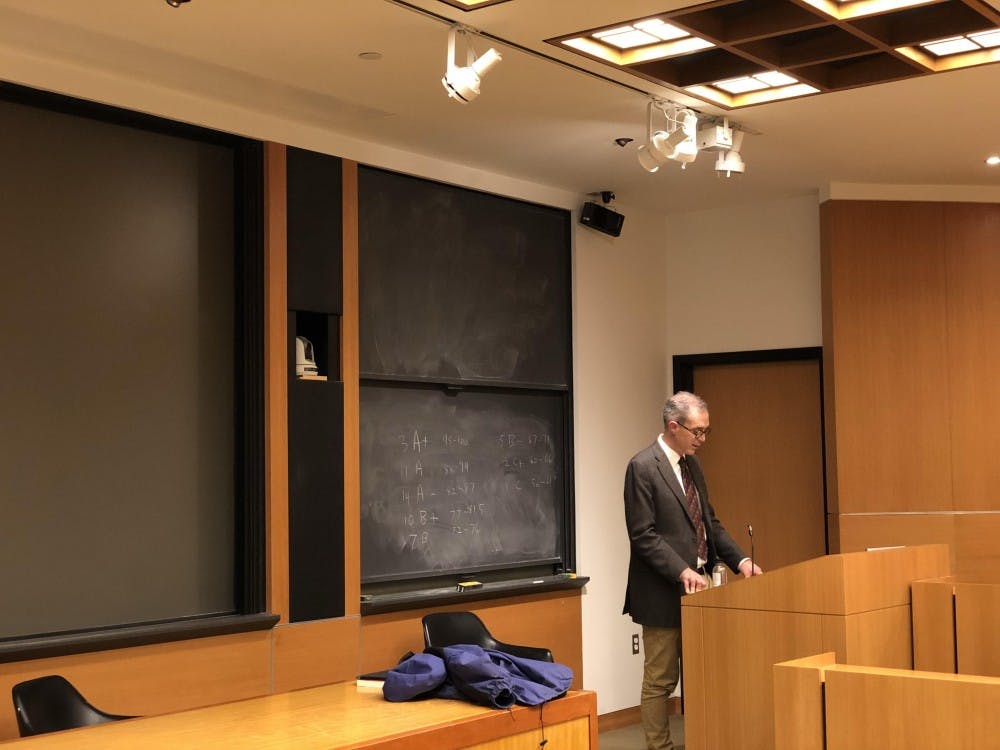When New York Times international correspondent David Kirkpatrick ’92 interviewed Egyptian then-president Mohamed Morsi in September 2011, he tried to begin with some small talk. Kirkpatrick asked Morsi for his thoughts about his time in graduate school at the University of Southern California. Confused, Morsi turned to his translator, who relayed the president’s thoughts to Kirkpatrick.
“The president is not sure how this is relevant to the interview,” the translator said. “Or is this socializing?”
Kirkpatrick, who served as the Times bureau chief in Cairo from 2011 to 2015, had a front-row seat to the tumultuous period in Egypt that began with the ouster of former president Hosni Mubarak in February 2011 and continued through the military takeover in July 2013. That takeover removed Morsi and installed General Abdel Fattah el-Sisi as the new head of the Egyptian government.
On Tuesday, Nov. 6, Kirkpatrick gave a lecture at the University about his experiences speaking with both civilians on the ground in Egypt and the decision makers in Egypt and the United States throughout his time as Cairo bureau chief. Those experiences shaped his reporting in his new book, “Into the Hands of the Soldiers.”
“Everything in the region we see today, ” Kirkpatrick explained, “[is] shaped by the aftershocks of what happened in the Arab Spring, and especially what happened in Egypt.”
In the book, Kirkpatrick tried to avoid writing the “typical” work about the Middle East — the kind that he said is written all too often by Western journalists. In these works, journalists live in a foreign country for a time, and after they witness civil strife and unrest, they write a book that focuses on the “poor buggers” living in a “god-forsaken country.”
According to Kirkpatrick, former President Barack Obama’s criticism of the “poor buggers” genre in his memoir “Dreams from My Father” inspired him.
“[His criticism] was really memorable to me because I thought he captured the way that a certain sort of fatalism can border on racism,” Kirkpatrick said. “I set out not to write a ‘poor buggers’ book.”

Kirkpatrick also focused on his personal relationships with the major actors involved. He conducted interviews with Morsi and his advisers, as well as senior officials in both the State Department and U.S. military who had lead the United States response to the events in Egypt.
For instance, Kirkpatrick recalled how the United States first came out in favor of Mubarak stepping down and giving up power. It was Thanksgiving of 2011, and up until that point the United States had been reluctant to call for Mubarak’s removal, largely because of its close relationship with the Egyptian military.
After a series of crackdowns by the Egyptian military, however, the White House finally released a statement on Thanksgiving calling for “the full transfer of power to a civilian government.”
“But it put out that statement [on Thanksgiving] only because the more senior officials … had gone home to have dinner with their families,” he explained.

The next morning, former national security adviser Tom Donilon was furious that the more junior officials had put out such a statement, but by then it was too late — it had become U.S. policy to support Mubarak’s ouster.
Kirkpatrick gave also insight into the tensions within the U.S. government about how to treat Morsi after he came to power. The White House and State Department both wanted to try to work with Morsi’s government. But the military was extremely skeptical of Morsi’s government and their intentions. Kirkpatrick recalled former director of defense intelligence Michael Flynn saying that he viewed the Muslim Brotherhood — which Morsi is affiliated with — as “tantamount to al-Qaeda.”
In speaking to one of the top civilian officials at the Pentagon, Kirkpatrick learned that the Egyptians felt that they were hearing two very different things from different U.S. policymakers, making it difficult to know where the country stood.
These divisions within the U.S. government were further displayed as the coup, which would eventually oust Morsi, was brewing. According to Kirkpatrick, the State Department did little to stop it, as they favored the military returning to power in the summer of 2013. At that same time, however, Obama was still advising Morsi on how to act.
Kirkpatrick concluded his talk on a somber note. He recalled how, six weeks after Sisi came to power, government forces confronted anti-government protesters in Rabaa al-Adawiya Square in Cairo, killing as many as 1,000 people in the process. According to Kirkpatrick, this was the largest single-day massacre of civilians in recent history and was even larger than the massacre at Tiananmen Square.
“When the anniversary of Tiananmen Square rolls out, we do a special section in The New York Times, and there are loud proclamations from the White House and the State Department,” he said. “You don’t hear that much about the massacre at Rabaa al-Adawiya, and I have to suspect that part of the reason is because American officials … feel somewhat complicit.”
The lecture was delivered at 4:30 p.m. in Robertson Hall and was sponsored by the Bobst Center for Peace and Justice.








